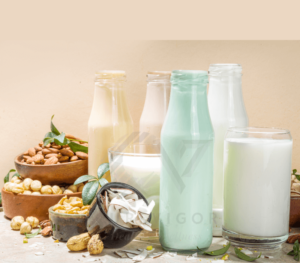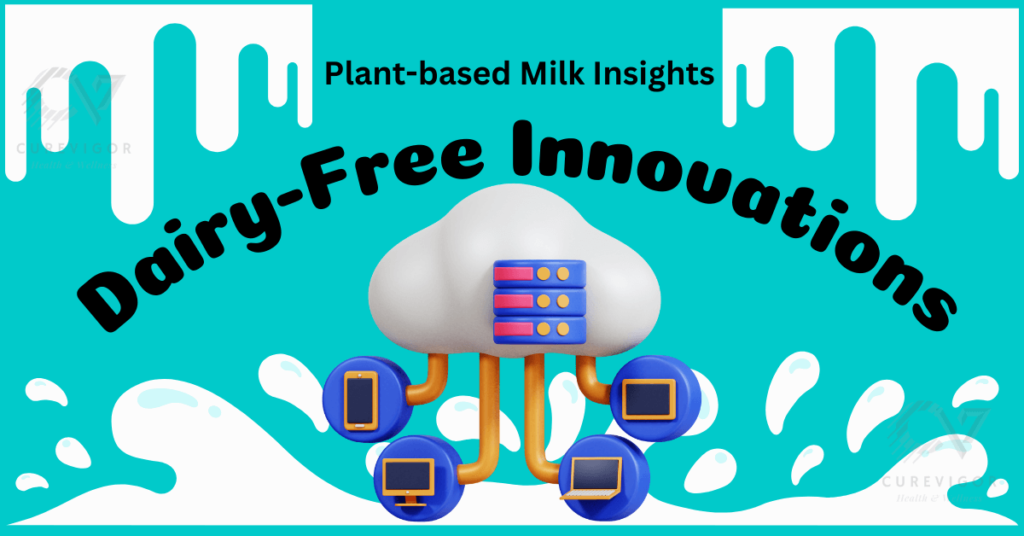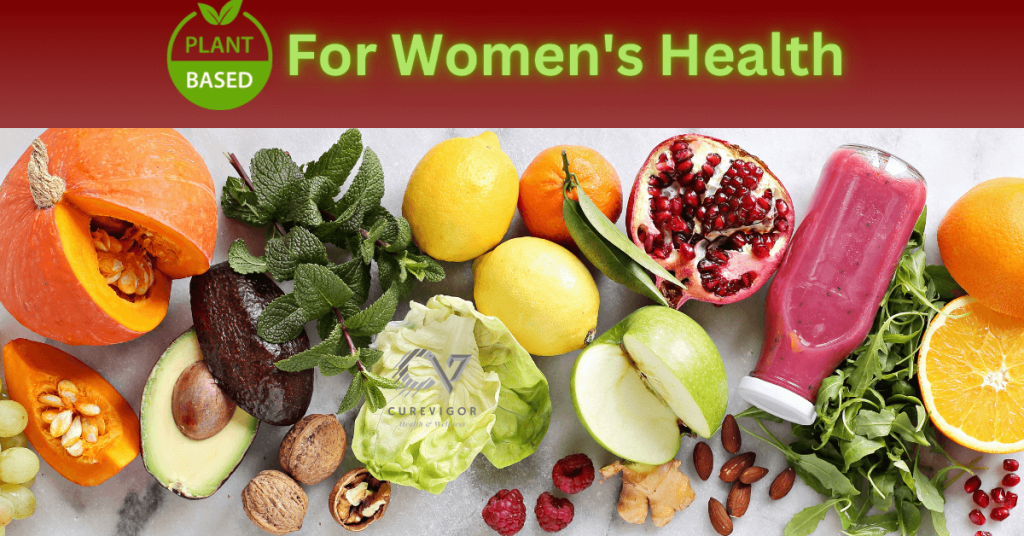Dive into plant-based milk alternatives, from eco-friendly options to cutting-edge technology. Usher in a new era of dairy-free living.
Contents
Exploring Dairy-Free Innovations: Plant-Based Milk Insights
Thanks to health-conscious customers and food technology advances, plant-based milk substitutes have become increasingly popular in recent years. As people seek healthier and more sustainable options, plant-based milk alternatives have emerged as a game-changer in the food industry. This article explores the dynamic landscape of plant-based milk, addressing health concerns and highlighting technological innovations reshaping how we think about dairy alternatives.
Health Benefits of Plant-Based Milk
Plant-based milk alternatives offer many health benefits, driving their popularity among diverse dietary preferences. Here’s a comprehensive breakdown of how these alternatives are changing the game in terms of health:

1. Lower Cholesterol and Heart Health
Plant-based milk stands out for its low saturated fat content, which can contribute to reducing cholesterol levels. Unlike traditional dairy milk, which can be high in saturated fats, plant-based alternatives offer heart-healthy options. Almond and soy milk, for instance, contain unsaturated fats that promote cardiovascular well-being.
2. Lactose Intolerance and Digestive Comfort
Dairy-free milk provides much-needed relief for individuals with lactose intolerance. Individuals can avoid the uncomfortable digestive issues often associated with consuming dairy products by opting for plant-based milk. Additionally, these alternatives are generally more accessible on the stomach and are well-tolerated, making them a go-to choice for those with sensitive digestive systems.
3. Nutrient Content and Fortified Options
The spectrum of plant-based milk is enriched with essential nutrients such as calcium, vitamin D, and B12. Manufacturers often fortify these alternatives to ensure they offer comparable nutritional benefits to dairy milk. The beauty of plant-based milk lies in the diversity of nutrient profiles across various options, allowing consumers to customize their choices based on individual nutritional requirements.
The surge in popularity of plant-based milk has given rise to an array of options, each with its distinctive attributes. To make informed choices, it’s essential to understand the unique features of each variety:
1. Soy Milk: The Classic Favorite
Soy milk is celebrated for its high protein content, which rivals that of dairy milk. This makes it an excellent choice for individuals looking to maintain or enhance their protein intake while embracing a plant-based lifestyle. Its neutral taste profile lends versatility, making it suitable for cooking and direct consumption.

2. Almond Milk: Nutty Flavor and Versatility
Almond milk offers a distinct nutty flavor accompanied by a slightly thinner consistency. Its natural flavor makes it a delightful addition to coffee, cereals, and smoothies. Almond milk has become a staple in many households with its pleasant taste and versatility.
3. Oat Milk: Creamy Texture and Eco-Friendly
Oat milk has gained popularity by boasting a creamy texture, particularly among coffee enthusiasts seeking a dairy alternative that froths well for lattes. Oat milk’s eco-friendly appeal stems from its minimal water usage during cultivation, aligning with sustainability efforts.
4. Coconut Milk: Richness and Exotic Appeal
Creamy and indulgent, coconut milk offers a tropical twist to plant-based milk options. Its richness and subtle coconut flavor make it an excellent choice for curries, desserts, and dishes that benefit from a hint of exotic taste.
Technological Innovations in Milk Alternatives
The landscape of food technology has ushered in transformative innovations that have redefined the production and quality of plant-based milk alternatives. Here’s a closer look at the cutting-edge techniques driving this revolution:

1. High-Pressure Processing (HPP)
High-pressure processing (HPP) stands as a game-changer in preserving plant-based milk. Unlike traditional heat-based pasteurization methods, HPP utilizes pressure to extend shelf life without compromising the nutritional value or taste. This technology effectively eliminates harmful pathogens while retaining the freshness and flavor of the milk, meeting the demands of health-conscious consumers seeking minimally processed products.
2. Enzyme-Based Production Methods
Enzymes are at the forefront of modern milk alternative production, contributing to smoother textures and enhanced taste profiles. Enzymes are used to break down raw materials, optimizing the milk composition for a more enjoyable drinking experience. This technology not only improves the overall sensory attributes of the milk but also enhances the bioavailability of nutrients, making the alternatives a more nutritionally robust choice.
3. Nanotechnology in Milk Fortification
Nanotechnology has revolutionized the fortification of plant-based milk alternatives, ensuring even distribution of fat-soluble nutrients. Nanoemulsions, consisting of tiny particles, aid in the dispersion of nutrients throughout the milk, enhancing their absorption by the body. This innovation addresses the challenge of delivering consistent nutritional content in every sip, making the milk flavorful and highly nutritious.
4. Sustainable Packaging Solutions
While not directly a production technique, sustainable packaging has become integral to technological advancements in the plant-based milk industry. Brands are now prioritizing eco-friendly packaging materials, such as plant-based plastics and recyclable cartons, to reduce the environmental impact of their products. This commitment to sustainability resonates with environmentally conscious consumers who seek products that align with their values.
Innovations in milk alternatives continue to evolve, driven by the desire to provide consumers with products that are not only delicious and nutritious but also environmentally responsible. These technological advancements underscore the industry’s dedication to staying ahead of the curve and meeting the diverse needs of consumers in an ever-changing world.
Environmental and Sustainability Considerations

The adoption of plant-based milk alternatives goes beyond personal health benefits; it’s also a crucial step towards a more sustainable and environmentally friendly future. Here’s an in-depth exploration of the environmental considerations associated with these alternatives:
1. Water and Land Usage in Milk Production
Plant-based milk alternatives generally require significantly less water and land resources than traditional dairy production. Almond milk, for instance, has a relatively low water footprint compared to the water-intensive nature of dairy farming. Additionally, oat milk stands out for its efficient water usage in oat cultivation, making it an eco-conscious choice for those concerned about water scarcity.
2. Packaging and Waste Concerns
The environmental impact of packaging is a pressing concern in today’s world. Many plant-based milk brands are making strides in reducing their packaging footprint by opting for eco-friendly materials and streamlined designs. By choosing products with sustainable packaging, consumers contribute to minimizing waste and lowering the overall environmental impact of their purchases.
3. Carbon Footprint Comparison
Plant-based milk alternatives have a notably lower carbon footprint than conventional dairy products. Dairy farming, relying on animal agriculture, tends to generate higher greenhouse gas emissions. By shifting to plant-based alternatives, individuals can actively contribute to mitigating climate change and reducing their overall carbon footprint.
4. Supporting Sustainable Agriculture
Culturing ingredients for plant-based milk alternatives often involves more sustainable agricultural practices. For instance, almond and oat cultivation require fewer resources and chemicals than raising livestock for dairy production. This shift towards sustainable agriculture aligns with broader efforts to promote regenerative farming practices prioritizing soil health and biodiversity.
5. Reduced Impact on Animal Welfare
Plant-based milk alternatives are also a conscious choice to support animal welfare. Dairy production involves raising and maintaining livestock, which can lead to ethical concerns related to animal treatment. Consumers contribute to a more compassionate and honest approach to food consumption by embracing alternatives that don’t involve animal exploitation.
Plant-based milk alternatives offer a pathway to a more sustainable and conscientious way of living in a world of environmental challenges. By considering the broader impact of our food choices, we can collectively make a positive difference in preserving natural resources, reducing pollution, and fostering a healthier planet for future generations.
Incorporating Plant-Based Milk into Your Diet
Embracing plant-based milk alternatives doesn’t just open doors to a world of health and sustainability; it also brings a variety of delicious and creative options to your daily diet. Here’s a guide to seamlessly integrating these alternatives into your lifestyle:
1. Substituting in Recipes
Transitioning to plant-based milk is as easy as making a simple swap in your favorite recipes; whether baking, cooking, or preparing beverages, replace dairy milk with your preferred plant-based alternative. The result? A healthier dish without compromising taste or texture. Try almond milk for creamy soups, oat milk for pancakes, or coconut milk for curries.
2. Smoothie and Coffee Creations
Plant-based milk alternatives excel in smoothies and coffee creations, adding creaminess and depth to your beverages. Blend your morning smoothie with almond milk to enhance the nutty flavor or opt for oat milk to achieve that velvety texture in your latte. The versatility of these alternatives allows you to experiment with flavors and tailor your drinks to your taste preferences.
3. Dairy-Free Baking Adventures
Elevate your baking game by incorporating plant-based milk into your recipes. The options’ diversity ensures you’ll find the perfect alternative for your baked goods. Create moist and flavorful muffins with almond milk, achieve a rich crumb in cakes with coconut milk, or whip up light and fluffy pancakes with soy milk.
4. Cereals and Granola Delights
Pouring plant-based milk over your morning cereal or granola is a simple yet satisfying way to enjoy these alternatives. The unique flavors of almond, oat, and coconut milk can enhance the taste of your breakfast, transforming the ordinary into a delightful experience. Plus, you’ll benefit from the added nutrients many plant-based milks offer.
5. Creamy Sauces and Dressings
Plant-based milk alternatives can create creamy sauces and dressings that are both flavorful and dairy-free. Experiment with almond milk to craft a velvety Alfredo sauce, or use oat milk to achieve a silky consistency in your salad dressings. These alternatives bring a new dimension of taste and texture to your culinary creations.

6. Snack Pairings
Elevate your snack game by pairing plant-based milk alternatives with your favorite treats. Dunk vegan cookies into a glass of almond milk or enjoy a handful of nuts with oat milk. The natural sweetness and distinct flavors of these alternatives can enhance the enjoyment of your snacks.
7. Store-Bought Convenience
If convenience is a priority, you’ll find many ready-to-drink plant-based milk alternatives in stores. From almond milk to coconut milk and everything in between, these options cater to your busy lifestyle, ensuring you have a nutritious and delicious alternative at your fingertips.
Incorporating plant-based milk alternatives into your daily routine is a journey of exploration and discovery. From enhancing the nutritional value of your meals to embracing new flavors, these alternatives offer a versatile and exciting path toward a healthier and more sustainable lifestyle. So go ahead, raise a glass to a world of plant-based possibilities!
FAQs on Plant-based Milk
Q: Who is the target audience for plant-based milk?
The target audience for plant-based milk includes individuals who are lactose intolerant, vegan, vegetarian, or simply seeking alternatives to dairy milk for health, environmental, or ethical reasons. Additionally, those looking for variety in their diet and exploring new culinary options are also part of the target audience.
Q. What is the plant-based milk industry trend?
The plant-based milk industry has been experiencing significant growth over the past decade, driven by increasing consumer awareness of health and environmental concerns associated with traditional dairy products. This trend is reflected in the expanding variety of plant-based milk options available in the market and the rising demand for dairy alternatives.
Q. What is the market research for plant-based milk?
Market research for plant-based milk involves analyzing consumer preferences, purchasing behavior, market trends, competitive landscape, and the impact of factors such as pricing, branding, and distribution channels. Research may also focus on identifying emerging market segments, understanding regional differences in demand, and assessing opportunities for product innovation and marketing strategies.
Q. What is the economic impact of plant-based milk?
The economic impact of plant-based milk includes factors such as job creation within the plant-based food industry, revenue generation for producers and retailers, and potential disruptions to the dairy industry. As consumer demand for plant-based milk grows, it can also lead to investment opportunities in plant-based food companies and related sectors.
Q. What is the future of vegan milk?
The future of vegan milk appears promising, with continued growth expected as consumers increasingly prioritize health, sustainability, and animal welfare. Advances in technology and product development are likely to lead to improved taste, texture, and nutritional profiles of plant-based milk alternatives, further expanding their appeal and market share.
Q. What are the reasons for plant-based milk popularity?
Several factors contribute to the popularity of plant-based milk, including:
- Health considerations: Plant-based milk is often perceived as healthier than dairy milk, as it is cholesterol-free, lower in saturated fat, and may contain beneficial nutrients.
- Environmental sustainability: Producing plant-based milk typically requires fewer resources and generates lower greenhouse gas emissions compared to dairy milk production.
- Animal welfare concerns: Many consumers choose plant-based milk to avoid supporting animal agriculture and the associated ethical issues.
- Dietary restrictions: Plant-based milk provides an alternative for individuals with lactose intolerance, dairy allergies, or dietary preferences such as veganism or vegetarianism.
- Flavor variety: Plant-based milk comes in a wide range of flavors and varieties, catering to diverse taste preferences and culinary applications.
Conclusion
In conclusion, the rise of plant-based milk alternatives is revolutionizing how we approach our diets and lifestyles. These alternatives offer various health benefits, from heart-healthy fats to relief for lactose intolerance, all while providing nutrient-rich options tailored to individual preferences. Navigating the diverse selection of plant-based milks, such as classic soy, nutty almond, creamy oats, and rich coconut, allows culinary exploration. Technological advancements, including high-pressure processing, enzyme-based methods, and nanotechnology, have transformed the production of these alternatives, enhancing taste and nutritional value.
Beyond personal health, embracing plant-based milk contributes to environmental sustainability by conserving water, minimizing waste, and reducing carbon footprints. The journey of incorporating plant-based milk into daily life is seamless, from substituting recipes to elevating smoothies, coffees, and baked goods. Whether for ethical, health, or environmental reasons, transitioning to plant-based milk alternatives opens doors to a more conscious, flavorful, and nourishing way of living.
Read more articles about Health & Wellness.



